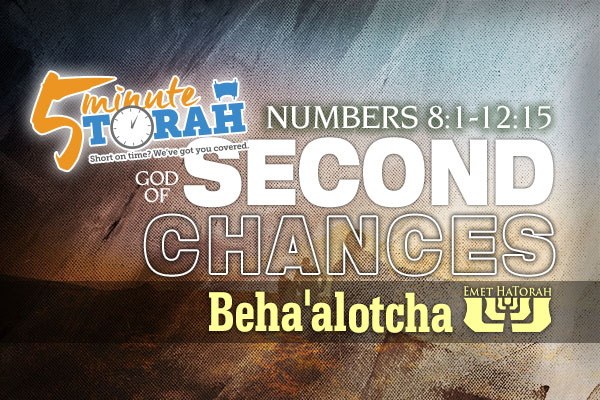Parashat Beha'alotcha - Numbers 8:1-12:15
Series:

God of Second Chances
In this week’s Torah portion, one of the things we learn about is how the Children of Israel offered the Passover for the very first time since their departure from Egypt (Numbers 9:1–14). It had been a full year since they left Egypt and it was time to fulfill the instructions they had previously been given: “You shall therefore keep this statute at its appointed time from year to year” (Exodus 13:10). Therefore, Moses instructed the Israelites to offer up the Passover at the appropriate time in the second year:
And they kept the Passover in the first month, on the fourteenth day of the month, at twilight, in the wilderness of Sinai; according to all that the Lord commanded Moses, so the people of Israel did. (Numbers 9:5)
Everything went well until a group of men came to Moses with a dilemma. They had come in close proximity to a corpse and had contracted corpse contamination—the most serious of all ritual contaminations and the most difficult to cleanse. They were unfit to partake of the Passover offering. They appealed to Moses saying, “Why are we kept from bringing the LORD's offering at its appointed time among the people of Israel?” (Numbers 9:7). Unlike our modern mentality which objects with, “Why do I have to?” these men were asking, “Why don’t we get to?” They were commanded to participate in the Passover, and they were eagerly anticipating doing so, but now they were unable to. What was the solution?
Moses, in his wisdom, did not reply to them immediately. He petitioned Hashem for an answer to the problem. The LORD’s response was that anyone in any generation who is “unclean through touching a dead body, or is on a long journey” at the time of the Passover, they will have an alternative ceremony that will be performed identically to the original Passover, but a month later. Rather than offering up the Passover on the fourteenth day of the first month (Nissan), they will offer it up on the fourteenth day of the second month (Iyyar). All of the same regulations and restrictions apply:
They shall eat it with unleavened bread and bitter herbs. They shall leave none of it until the morning, nor break any of its bones; according to all the statute for the Passover they shall keep it. (Numbers 9:11–12)
Although this stipulation was not originally part of Hashem’s instructions for the Passover, in His mercy He made an exception for those who were not able to participate at the proper time due to uncontrollable circumstances. Many people believe that the Torah is legalistic and often the God of the Jews is characterized as being hostile and malicious. But this incident proves otherwise. We can see from this that the God of Israel is a God of second chances. If a person is sincere and wants to obey Hashem’s instructions, but is unable to for reasons beyond their control, Hashem extends mercy and even merits them as if they had fulfilled it in its original manner. However, there is a caveat. Hashem’s mercy cannot be taken advantage of without repercussions:
But if anyone who is clean and is not on a journey fails to keep the Passover, that person shall be cut off from his people because he did not bring the LORD's offering at its appointed time; that man shall bear his sin. (Numbers 9:13)
If a person has the opportunity to obey but intentionally chooses otherwise, he will bear his own guilt and suffer the consequences thereof. Does this only apply in pre-New Testament times? James, the brother of our Master Yeshua, alludes to this concept in his epistle. He tells his readers, “So whoever knows the right thing to do and fails to do it, for him it is sin” (James 4:17). Yes, the LORD is merciful and understanding, but we should never suppose that His mercy is acceptance of inappropriate behavior. Hashem’s kindness should to lead us to repentance (Romans 2:4), and His faithfulness to devotion. Yes, our God is a God of second chances, but let us not abuse His mercy.








